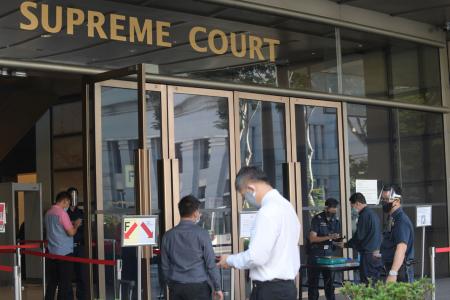Malaysian drug runner escapes gallows for the second time
Malaysian given original sentence of 15 years' jail and 10 strokes after Court of Appeal reviews case
A Malaysian drug runner escaped the gallows for the second time yesterday, after a five-judge Court of Appeal reversed a 2018 decision to convict him of a capital charge, in what the court called an exceptional case.
Gobi Avedian, 32, was instead given 15 years' jail and 10 strokes of the cane, the original sentence handed out by the High Court in 2017.
Yesterday's decision was based on a change in legal position in a 2019 case involving Nigerian Adili Chibuike Ejike, who was spared the gallows upon appeal because he was found not to know of the presence of the drugs.
The apex court had ruled then that the legal concepts of actual knowledge and wilful blindness were "separate and distinct".
Wilful blindness is a legal term for the mental state of a person who suspects the truth but deliberately refuses to investigate further.
Gobi was originally charged with the importation of 40.22g of heroin, after he was caught at Woodlands Checkpoint on Dec 11, 2014.
He first avoided the death penalty in 2017 after a High Court judge accepted his account that he believed he was carrying "disco drugs" mixed with chocolate, rather than heroin.
Justice Lee Seiu Kin instead convicted Gobi of a reduced charge of attempted importation of a Class C drug, and sentenced him to 15 years' jail and 10 strokes of the cane.
The prosecution then appealed, pushing for the original capital charge.
In 2018, a three-judge apex court allowed the appeal and handed down the death penalty, ruling that Gobi had failed to rebut the statutory presumption of knowledge of the nature of the drugs he was carrying.
In February this year, Gobi filed an application for the court to review its decision in 2018 to convict him of the capital charge.
His lawyer M. Ravi questioned the correctness of that decision, in the light of the decision in Adili's case. He argued that the ruling in Adili's case should be extended to the presumption of knowledge.
ACTUAL KNOWLEDGE
He argued that since the prosecution's case against Gobi at the trial was one of wilful blindness, the prosecution could not have invoked the presumption in the first place. But the prosecution maintained that its case was premised on actual knowledge.
Yesterday, the court, led by Chief Justice Sundaresh Menon, accepted that Gobi's case should be reopened.
It held that the knowledge that is presumed under the Misuse of Drugs Act is confined to actual knowledge and wilfully blindness is irrelevant to whether the presumption has been rebutted.
The court found that the prosecution had changed its case, from one of wilful blindness at the trial, to one of actual knowledge on appeal, which was prejudicial to Gobi.
It held that Gobi's failure to rebut the presumption of knowledge could no longer form the basis of his conviction on the capital charge. It also found that he was not wilfully blind to the nature of the drugs.
The court noted that he had made certain inquiries into the nature of the drugs but was assured that the drugs were "not serious".
It set aside his conviction on the capital charge and reinstated his initial conviction by the High Court.
Get The New Paper on your phone with the free TNP app. Download from the Apple App Store or Google Play Store now


